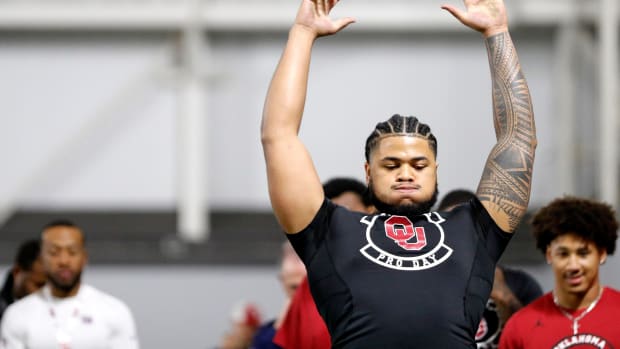Who Does Joe Castiglione Want as Oklahoma's SEC Rivals? Texas and, Well ...
NORMAN — Although he approaches the future with a reserved pragmatism, Joe Castiglione isn’t afraid to ponder what lies ahead.
What lies ahead for Oklahoma is membership in the Southeastern Conference — and that’s about all that’s known right now.
Will the SEC favor an eight-game conference football schedule, or nine? Will schools retain just one permanent rival, or three?
“They have to happen,” the Sooners’ athletic director said Tuesday after the OU Board of Regents meeting. “I don’t think we want to walk into the new conference and not see the University of Texas every year.”
There has been an unending number of models and variations proposed by fans and media about what the SEC will look like when the Sooners and Longhorns begin membership in August 2024. But most of those seem to have coalesced around either an eight-game schedule (with one permanent or “traditional”opponent or a nine-game schedule (with three permanent rivals).
Late last week, Sports Illustrated’s Ross Dellenger compiled what has come to be viewed as a sensible arrangement — still purely speculative, but nonetheless entirely feasible — for the future SEC.
In the SI model, Oklahoma's permanent rivals are Texas, Missouri and Florida.
Traditionalists might prefer a border rivalry with Arkansas, or an annual dust-up with Texas A&M, if for nothing but bragging rights in recruiting and oil fields. Missouri is an old Big Eight/Big 12 foe, but the Tigers don’t much to move Sooner Nation. And as for Florida, there’s nothing traditional there — but does come with the potential for future recruiting inroads in the Sunshine State.
“What is certain,” Castiglione said, “is that the membership feels strongly that whichever model you choose, we want the other SEC member institutions to rotate to every campus at least once over a four-year period.”
For example, in the current SEC setup, Georgia still hasn’t played in College Station even though the Aggies have been SEC members for going on a dozen years. That’s what decision-makers want to avoid in the new 16-team league.
FOR MORE
- WATCH: Oklahoma AD Joe Castiglione Interview
- Oklahoma Football Coaches Receive Extensions, Raises Heading into Year Two
- Oklahoma AD Joe Castiglione Discusses Feasibility of New Basketball Arena
Castiglione said there are “key analytic groups” that are looking into “all the logistical elements around that” to create a fair and balanced schedule.
“So I expect that we'll continue to be part of those conversations,” he said.
The clarity that came with last month’s announcement that OU and Texas are leaving the Big 12 and joining the SEC in 2024, and not 2025, has ignited the process behind such high-level decisions.
“We’ve been at the table now talking about the future scheduling,” Castiglione said. “There are number of sports where they've already reached consensus on how the schedule will go — how many conference competitions, obviously varying from sport to sport, how that will take place.
“Football’s one that they haven't completely reached consensus on two things: one, whether the conference will continue as an eight-conference game schedule or move to a nine-conference game schedule. So … those two elements are combined for one big decision. But, depending on what gets approved or embraced by the conference, each of those have different scheduling components.”
Castiglione was AD at Mizzou before he came to OU. Maybe he has a vested interest in fostering Oklahoma-Missouri as a new rivalry in the Sooners’ new conference.
If so, he’s not telling.
Who, besides Texas, does Joe C. want?
“That's not for me to speculate in front of you all,” he told reporters with a chuckle. “When we're in the closed doors, we might be asked that, and we'll give our answer. But I think there are a multitude of factors.
“And we’ve obviously made it clear that we want to remain and have our rivalry with the University of Texas, and we'll see how the other models dictate the other competition, whether it's an eight-game schedule or the changes that nine-game schedule would bring.”
Castiglione said OU’s current focus is on competing in the Big 12 Conference — “we’re very mindful of where our feet are planted,” he said.
“That being said, now we're moving moving forward working with the SEC, and and very fortunate that Commissioner (Greg) Sankey and the the SEC leadership has included both Oklahoma and Texas in number the conversations about the proposed adjustments, going from 14 to 16 members — and not just at-large, but how that impacts each and every sport.”
“We trust in the leadership of Commissioner Sankey and the rest of the my colleagues that we’ll come with a solution somewhere soon. … I know there's been some that are speculative, but be careful to not get caught up in anything right now. It's still a very fluid process.”





